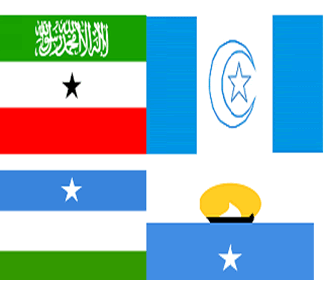by Muuse Yuusuf
Tuesday, July 05, 2011

Birthday party for illegitimate father?
This month marks the 51st anniversary of Somalia’s independence from Britain and Italy and the unification of the northern and southern regions, which have created the Somali Republic. Many Somalis have been trying very hard to conceptualise the occasion or understand what it stands for. Indeed, from Nairobi to Mogadishu, Hargeisa to London and other major cities across the world, different Somali constituencies have been celebrating what looks like the birthday of a 51-year-old illegitimate father born out of wedlock. With their different flags and state paraphernalia, they contest the identity of this metaphorical and imagined being.
To some, they claim that their father was born on 26 June 1960 by a father whose identity was known as the British Colonial Administration and his wife: the northern regions of the Somali nation. To them, they do not recognise any child who was born on 1 July 1960 and see this as one big mistake in a one night stand affair in a half century ago, something that should be buried and forgotten forever. To them, the most important in life right now is to resuscitate the body and soul of their lost relationship, their father of 26 June 1960. The only way to do this is by pursuing the realisation of their dream of an independent Somaliland. They have been working very hard to nurture their entity by creating functioning state structures and institutions, which they hope will facilitate their nation’s acceptance as an equal partner among sovereign states in the United Nations’ General Assembly. They will not accept any thing short of a sovereign Somaliland.
|

Illegitimate offspring?
|
There is a rather cynical group which argues that the father was illegitimate because he was the offspring of two European colonial powers that metaphorically had sexual intercourses with the Somali nation or put it painfully had raped a beautiful virgin Somali girl. To members if this group, it is not worth celebrating the birthday of such obnoxious and dishonoured being with confused identities and characteristics. To make their point, they point out that as it is often the case illegitimate fathers always produce bastards and this is exactly the case in Somalia of today where many entities are born by the day. One only needs to look at the contemporary political landscape from Puntland to Maakhir state, Somaliland to Awdal state where different stakeholders are adopting new and conflicting communal identities and loyalties. Incredible as it sounds, the internationally recognised Somali government is celebrating the occasion in Villa Somalia, the presidential palace, in a hostile and bunker mentality in which the president and other officials are dodging assassination attempts by a disgruntled insurgency. Worsen than that, others are not even allowed to celebrate the occasion and cannot even raise their beloved blued coloured flag in their beloved homelands. This is because newly adopted flags with different names are being forcibly erected in their country in order to replace their beloved flag, reminding me of the famous nationalistic song “Kanna Siib Kanna Saar”: lower the colonial flag and raise the national flag.
To others, the contested father was born on 1 July 1960 and is the only legitimate being because his birth was witnessed by the international community when the UN agreed to recognise Somalia as an independent state on that remarkable and memorable date. To them, they do not recognise any other beings born on other dates. To them, they cannot deny the importance of celebrating the Independence Day to honour and remember Somalis have sacrificed their possessions and lives for the sake of not only liberating their occupied territories but also unifying them with those still under occupation. Although they feel ashamed, guilty, and embarrassed of the failures and missed opportunities that have led to the disintegration of father’s descendents into fighting tribal fiefdoms and enclaves, to honour their father’s birthday is must and a national duty at any cost.
Anyway, for the record, I am celebrating with the latter group with their mixed feelings and anxiety. And despite the obvious doom and gloom picture of contemporary Somalia, I am happy to be a proud Somali who would like to share with you the following positive news found amidst the ruins.
Since the outbreak of the civil war, Somalis, regardless of their political identity and loyalty, have shown remarkable resilience in front of unimaginable obstacles, and have revealed their character as masters of survival as they normally do in their unforgiving and harsh environment. With limited resources, Somalis have made some remarkable achievements in many sectors, and, indeed, some Somalis have come out and are coming out of the tragedy stronger and much better than ever.
Politically, if the main reason for the civil war from 1988 was a rebellion against a centralised state structure and dictatorship, in which Villa Somalia was the main powerhouse dominated by elites, then Somalis have successfully dismantled this repressive structure. Despite the threat of secession, what Somalis have right now is strong and assertive regional states or administrations, which are exercising some kind of self-rule. In general, Somalis are today autonomous and independent of a centralised government structure. Political power is based in Hargeisa, Garowe, Baidoa, Galkayo, Kismayo and Beledweyn and not in Villa Somalia. Indeed, rather than govern the whole country the internationally recognised successive Mogadishu-based transitional national governments have been reduced to no more than few individuals trying to control a few blocks in Mogadishu surrounded by rebels. However, it is really sad that it took 30-40 years and a lot of suffering before these cities could taste regional autonomy and assert their freedom from Mogadishu. Also, one wonders whether some of these regional states with a secession tendency, such as Somaliland, are really seeking total independence, or merely craving for and expressing their desire for greater freedoms and self-autonomy, which have been denied them by previous governments, particularly during the dictatorship in which the famous Villa Somalia was the power-house. The only thing that is missing is a strong federal United States of Somalia to accommodate all these powerful regional states. This is an opportunity not to be missed.
In addition, Somalis are freer than they were during the dictatorship, and have access to a wide range of media outlets. Indeed, unlike the pre-war era, particularly during the military government, where the state-controlled media had suppressed freedom of expression and source of news and information, the post-1990 Somalia experienced a huge growth in the media sector. If the central government’s famous Radio Mogadishu and Hargeisa were the only stations in the whole country, by 2005 there were 22 radio stations in the country. Spearheaded by Radio Shebelle, HornAfrik, Radio Galkayo, and Radio Garowe, these media outlets provide a range of information and news. In a pre-war country with only one TV station, 200,000 television sets and 600,000 viewers, by 2005 there were seven TV channels. If yesterday the collapsed central government’s few newspapers such as Xiddigta October (Octobar Star) had monopolised the printed media, the proliferation of up to fifty newspapers have revealed Somalis’ appetite for news, information, and freedom of expression.
Economically, despite the chaos, Somalis within their regional states and administrations have shown resilience and ingenuity in maintaining an informal economy, which has survived and in some cases thrived throughout the conflict. Some economists have even dubbed post-1990 Somalia the purest capitalism experiment, or free market and laisez faire economy at its best where the private sector has overtaken the public sector due to lack of government intervention. This informal economy fuelled by remittance by the diaspora and a resilient rural economy is not qualitatively different from other countries with weaker and failing economies and political institutions. What has happened in reality is that an efficient private sector has overtaken the collapsed corrupt and failing state economic institutions. Indeed, some economic sectors, such as telecommunications and financial sectors have performed much better than the pre-war era.
In the education sector, Somalis have access to more educational institutions or facilities, as student enrolment in primary and secondary schools continue to improve. Indeed, compared to other neighbouring countries such as Djibouti and Eritrea, Somalis have more universities and higher education colleges than these two countries. Out are those days when the Somali National University in Mogadishu was the only dominating educational institute in the whole country. There are universities and colleges in major cities across this beautiful but broken country.
With regard to Somalis’ overall human development post-1991, Somalis are better off in some sectors now than ever. For example, the life expectancy of a Somali at birth was higher in 2005 with 48.47 years compared with 46 years at pre-war. Less Somalis are living in extreme poverty than they were during the central government. More Somalis have access to water and improved sanitation and health facilities than ever. For instance, in 2002, 54.8% of Somalis had access to at least one health facility compared to 28% pre-war within a distance of 1.3 km and 2.4 km, and 63% of urban dwellers and 36% of rural communities confirmed affordability.
Although there is an argument that Somalia’s human development indicators would have improved with or without state, there are some indications that Somalis have performed well than their neighbouring countries with formal state structures. For example, Somalis’ life expectancy was much higher than in Kenya and Djibouti, indeed, life expectancy in these two countries deteriorated during 1990-2005. This refutes the argument that Somalis’ human development would have improved either way.
In conclusion, despite the gloom and doom, things are not bad as they look and there are some remarkable achievements that should be protected and celebrated.
Muuse Yuusuf
[email protected]
References:
Leeson, Peter T. (2007). Better Off Stateless: Somalia Before and After Government Collapse, Department of Economics, West Virginia University
Little, Peter D. (2003). African Issues Somalia: Economy Without State. Oxford, Bloomington, Hargeisa: International African Institute in association with James Currey; Indiana University Press
World Bank and UNDP – WB/UNDP (2003). Socio-Economic Survey 2002, Report No. 1 Somalia Watching Brief 2003
World Bank and United Nations – WB/UN (2006). Somali Joint Needs Assessment, Social Services and Protection of Vulnerable Groups Cluster Report, 14 September 2006
Ismail, Jamal Abdi (2006). Africa Media Development Initiative